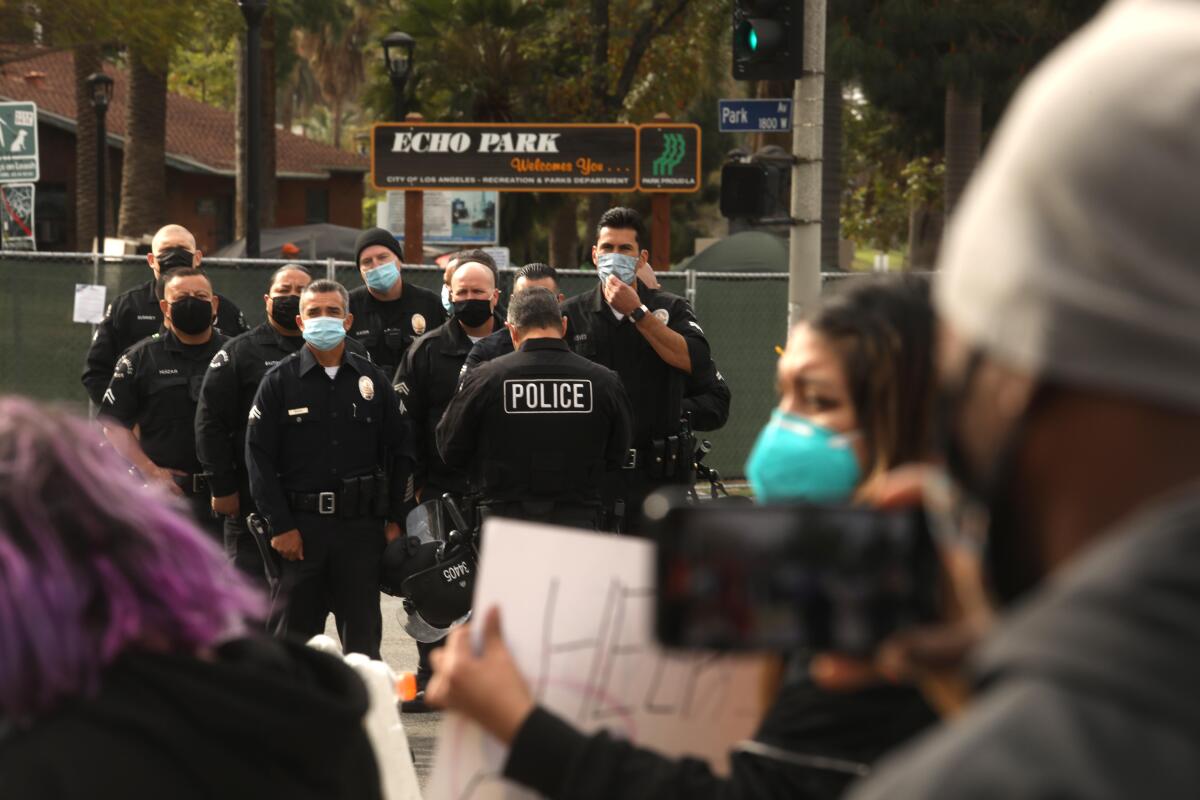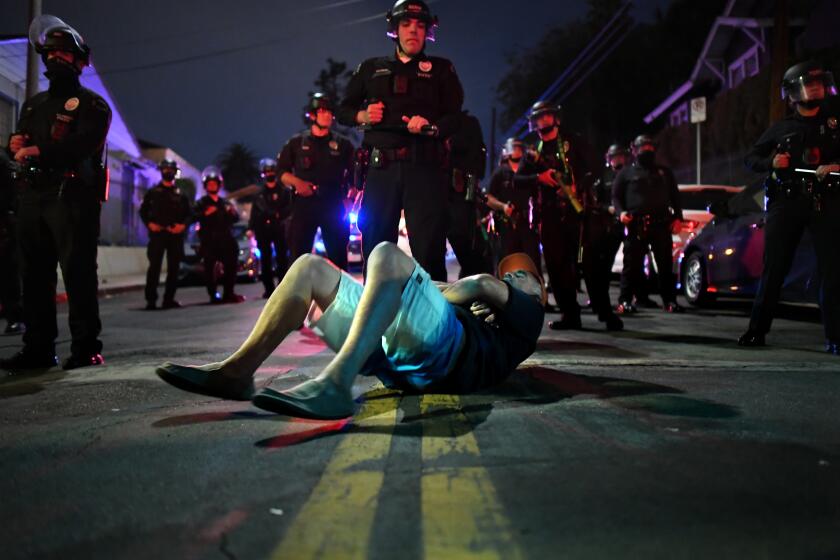Column: In Echo Park, a glaring example of L.A.’s failed leadership on homelessness

- Share via
What happened at Echo Park Lake this week, and over the past couple of years, should never have happened.
We all know by now that with roughly 60,000 unsheltered people in Los Angeles County, there are no quick or easy answers. That’s because at the macro level, we’ve built an economy, a housing market and a society that guarantee extremes of wealth and poverty, winners and losers, palaces and pup tents.
But a public park on the edge of downtown Los Angeles never should have been allowed to become an encampment — or a political flashpoint over the conflicting rights and interests of the housed and the unhoused.
It happened because of an epic failure of leadership. And, on a smaller scale, dozens of similar dramas are playing out across the region.
LAPD and protesters square off in Echo Park as an imminent city closure draws near.
Tensions had been mounting in Echo Park for months, as the needs of homeless men and women camping on its lawns bumped up against the needs of those who used the park for recreation, in a city sorely short of park space. As friction mounted, city officials underreacted, allowing the situation to fester while trying to please all sides, only to then swoop in with a heavy hand.
“The fact that more than 150 people from Echo Park Lake have been housed is a major achievement,” L.A. City Councilman Mike Bonin tweeted. “But the deployment of scores of police officers there in riot gear is wrong, counterproductive, and needs to stop.”
I agree. But it happened because city and county officials, despite some progress, lost their way long ago and haven’t convinced anyone that they can manage the needs of either the homeless or the housed.
On Thursday morning, roads surrounding the park were closed, and the park’s remaining outdoor residents had been given until Thursday evening to take advantage of temporary housing offers. Up the hill to the east, in Angelino Heights, several people peered down toward the park, which had been fenced off.
Carrie Sutkin, who used to live near the park and now lives in nearby Elysian Valley, was happy to see the conflict finally come to a head, with city crews preparing to repair damage to the park while offering housing — however temporary — to the park dwellers.
But she didn’t spare city officials for allowing the situation to fester, calling out Mayor Eric Garcetti and Councilman Mitch O’Farrell in particular. If you’d been allowed to stay in the park for two years, Sutkin said, it’s only natural that “you’d feel like you live here,” and resist eviction efforts once city officials finally found the courage to act.
“The homeless situation is horrible,” said a 20-year Echo Park resident named Richard, who didn’t want to give his last name for fear of reprisals. “But those 200 people living there had taken the park away from thousands.”
That’s not to say that some nearby residents didn’t still use the park, but Richard said that as the city lost control, he regretfully avoided it. As we spoke, a couple walked by and said they were happy to see the city finally stepping up and forcing a resolution despite resistance from tent dwellers.
I didn’t hear what could be called NIMBYism from any of the people I spoke to, or lack of compassion for the destitute. Instead, I heard exasperation with the region’s continuing struggle to provide enough affordable and supportive housing so that thousands aren’t living in their vehicles or on city streets.
Cecilia Rios, who runs Echo Park Barber Shop and collects clothing she donates to the poor, told me she had been avoiding visits to the park, which for decades was a popular weekend destination for working class Latino families. She said she hopes the park dwellers get decent living spaces, and that area residents can soon return without qualms to a clean, reclaimed park.
“There are dozens of Echo Parks in the county,” said Miguel Santana, a former city and county official who is now president and chief executive of the Weingart Foundation. “The biggest lesson here is that without a systematic approach, each elected official and neighborhood is on their own to do the best they can. Most efforts are well-intended but are destined for failure.”
Last month, I wrote about a besieged neighborhood on the edge of Hollywood and Los Feliz, where housed people fear retaliation for speaking out about gang activity and growing encampments on their block. On Thursday, one of those people told me he saw a parallel between his experience and what happened in Echo Park.
“Not addressing the problem early will lead to greater problems and unexpected consequences,” he told me, and all he needs to do to affirm that notion is to look out his window, where elaborate shanties are built and conflicts have sharpened.
In Echo Park, O’Farrell and other officials can’t be accused of doing nothing. It’s more complicated than that, in Echo Park and beyond, and some of the blame falls on the city’s legions of so-called liberals who throw tantrums over proposals for higher density buildings, affordable housing and essential services in their neighborhoods.
To be fair, thousands of people have been housed in the last couple of years. But more people keep trailing in behind them — the destitute, the physically and mentally ill, those with addiction issues — and we’re losing ground. Many of those we don’t reach will die, or become sicker, or become victims of crime, so there’s no time to waste.
But bringing people indoors is next to impossible when you don’t have enough places for them to go, when the cost and pace of building new housing are insane, and when it remains unclear who, if anyone, is in charge.
On Thursday morning, Bishop John Harvey Taylor toured the lake, which is across the street from the headquarters of the Episcopal Diocese of Los Angeles where he is based. He later told me he’s not choosing the side of either “our housed or unhoused siblings,” but he said there’s clearly been a breakdown when homeless people call a park their home.
“Political leaders need to step up to the plate,” Taylor said, and create a network of sanctioned and secure encampments on the properties of nonprofits, churches, and underutilized or abandoned publicly owned facilities. That’s not a preferred or permanent answer, he said, but a more humane way to move forward.
“I do not happen to believe that every citizen has a right to be in a park and live there,” Taylor said, “in part because the park is for the entire community and ultimately you cannot have it be an overnight residential community. And that’s not the fault of the unhoused, it’s the fault of the city.”
To add to that thought, we’ve had thousands of empty hotel rooms for the past year, and thousands of empty college dorm rooms, too, even as our streets and riverbeds are lined by tents and homeless people die at the record-setting rate of nearly four a day.
We move at a snail’s pace, and there’s no one in the halls of power who consistently and convincingly says shame on us, and this must change, and I will lead the way.
Unless and until that happens, we’ll never get beyond the echo, you might say, of what happened in Echo Park.
More to Read
Sign up for Essential California
The most important California stories and recommendations in your inbox every morning.
You may occasionally receive promotional content from the Los Angeles Times.











